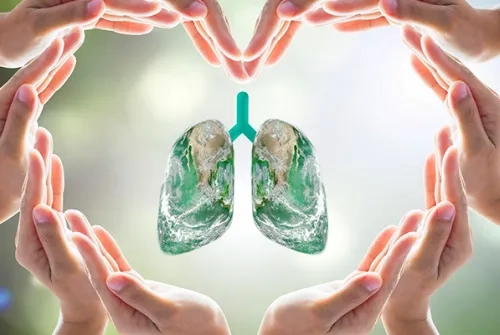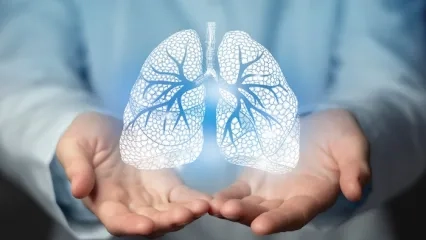Alo Yeditepe
Alo Yeditepe
What Should Asthma Patients Be Cautious About?
There is no definitive cure for asthma. However, emphasizing that the disease can be controlled with lifestyle changes and regular use of drugs, Yeditepe University Hospitals Chest Diseases Specialist Asst. Prof. Dr. Seha Akduman made important recommendations in this regard.
Asthma is seen on average in one in 10 adults and children in our country. In recent years, it has been increasing in both children and adults. Stating that the disease, which causes loss of lung function in undiagnosed and untracked patients over the years, also reduces the quality of life, Chest Diseases Specialist Asst. Prof. Dr. Seha Akduman made the following statements as part of World Asthma Day on May 2:
Causes of Asthma
Asthma is a chronic disease characterized by hypersensitivity in the airways. Hypersensitivity in the airways (bronchi) causes narrowing of the airways, increased sputum production and persistent cough as a result of inflammation (inflammation). Asthma patients who smoke and remain untreated exhibit COPD (Chronic Obstructive Pulmonary Disease) characteristics. Allergens are substances that are harmless to our body but can cause a reaction of the immune system in susceptible people.
80% of asthma in children and 50% in adults is caused by allergies. The most common allergens are pollen, house dust mites, mold spores, cockroaches, animal hair and foods such as eggs, peanuts, fish, wheat, soy. There are many risk factors such as genetic predisposition, obesity, having an allergic body, and exposure to occupational harmful particles. However, air pollution and smoking are among the factors that cause stress or emotional changes, especially exercise and cold air asthma attacks in uncontrolled asthma.
How Do Asthma Symptoms Manifest?
Complaints in asthma patients usually come in the form of seizures. The most important symptoms are shortness of breath, cough, feeling of pressure in the chest, and shortness of breath after exposure to odor, dust, smoke, and allergen. These symptoms, which may vary depending on the seasons, usually occur at night or in the morning. Coughs appear in the morning, in the form of stubborn attacks, sometimes with wheezing. The feeling of not having enough breath is also very common among patients.
Asthma Treatment
Since asthma is a chronic disease, there is no definitive cure. However, it is possible to achieve full control with appropriate treatment. The basic principle is cascade treatment. Medications are divided into therapeutic and short-acting rescue drugs. Therapeutic agents should be decided under the control of the physician, and the patient should be told in which situations the rescue drugs should be used. Patient education is of great importance especially for the early start of attack treatment. It should be kept in mind that patients who are neglected and not under full control for many years will develop permanent damage over the years and their lung capacity will decrease irreversibly.
What Should Asthma Patients Be Cautious About?
Be aware of the factors that cause attacks and avoid them.
- Asthma is a heterogeneous disease and individual differences are numerous. Recognize your disease. Observe when and how your complaints increase and take action accordingly.
- Asthma is an extremely dynamic disease. It changes with the season, with the week, with the day. Even the journeys affects it. Therefore, the use of drugs in such an active disease should also be dynamic. Drug doses should be reviewed and regulated with regular examinations. In summary, it is very important for the patient to be in regular contact with his/her doctor in the control of asthma. Do not miss your checks.
- Use your medications regularly and do not interrupt unless your doctor recommends it.
- The quality of the inhaled air is very important. Avoid harmful gases, detergents, bleach, dust, air pollution, tobacco and tobacco products and smoke as active or passive smokers.
- Keep in mind that upper respiratory infections can cause a picture that can go as far as life-threatening severe attacks and pneumonia. Be sure to get your pneumonia and flu vaccines as you may have these infections severely.
- Obesity is a huge risk factor for asthma. Hormones secreted in obesity trigger asthma. Therefore, try to maintain weight control.
- The presence of reflux in asthma patients may trigger attacks. Therefore, if you have reflux, be sure to treat it.
- Even though asthma is fully controlled, if the cough continues, it should be taken seriously. Because in 70bpercent of patients, asthma can also be accompanied by allergic rhinitis. If you have a persistent cough because uncontrolled allergic rhinitis can cause asthma to be triggered, be sure to have an otolaryngology examination.
- Controlled drug use is required, especially in drug-induced asthma groups. Use painkillers and flu medications that can trigger attacks under the supervision of a physician.
Press Coverage: Sözcü
About
Faculty and Year of Graduation:
Gazi University Faculty of Medicine, 2007
”
See Also
- How to Cleanse Your Lungs?
- Is Breathing Air Dangerous in Fires?
- What is Electronic Cigarette Disease (EVALI)? EVALI Symptoms and Treatment
- What is COPD? Symptoms and Treatment of COPD
- Long Journeys Increase the Risk of Embolism!
- What Asthma and COPD Patients Should Pay Attention to When Using Air Conditioning!
- What is Allergy? What are the Symptoms of Allergy?
- What is Desert Dust? Harms of Desert Dust
- What is Tuberculosis (TB)? Symptoms and Treatment
- Circadian Rhythm Disorder
- Lung Cancer Screening Age
- What is Good for Cough? How to Cure Cough?
- Lung Cancer Symptoms and Treatment
- 10 Ways to Have a Sound Sleep in the Heat
- Does Poor Quality Sleep Increase The Risk of Asthma?
- What is Allergy? What are Allergy Symptoms?
- What Causes Insomnia, Diagnosis and Treatment
- 9 Common Misconceptions About COPD
- Causes, Symptoms, and Treatment of Asthma
- COPD Makes You Age Early
- Allergy and Asthma During Pregnancy
- It Is Aimed to Eliminate Tuberculosis Worldwide By 2030
- Pollen is Now Seen Outside of Seasonal Changes
- Do Dental Caries Increase the Risk of Pneumonia?
- Lung Patients Should Not Stop Their Medications
- Smoking Rates Under the Age of 15 Are Increasing
- Inhaling Electronic Cigarettes for a Few Minutes Causes Damage to Vein Wall
- 4 Significant Preliminary Symptoms of Lung Cancer
- People Who Smoke More Than 25 Cigarettes a Day Have a 50-fold Increased Risk of Lung Cancer
- How Does Acid Rain Affect Human Health?
- Can Back Pain Be A Sign of Lung Cancer?
- Nine Out of Ten COPD Patients Do Not Know They Are Sick
- The Slowing Traffic in Istanbul Increases the Risk of Cancer!
- The American Cancer Society Has Announced; The Age of Screening For Lung Cancer Has Decreased
- Hidden Lung Cancer Cases Revealed in Tomographs Taken Due to Coronavirus
- Quitting Smoking Even After Diagnosing Lung Cancer Effects Lifespan
- Electronic Cigarettes Can Cause Heart Attacks!
- Pollen Allergy Has No Season
- Beware of Little-Known Risks of Smoking!
- Obesity is Both a Cause and Consequence of Sleep Apnea
- Asthma and COPD Attack Season Begins
- Lung Cancer
- Snoring and Its Treatment
- Does the Pneumonia Vaccine Protect Against the Coronavirus?
- In Case You Are Unable To Sleep Even If You Are Tired, Your Circadian Rhythm May Be Disrupted
- Using Antipyretics Uncontrolled Can Hide Pneumonia Symptoms
Alo Yeditepe





